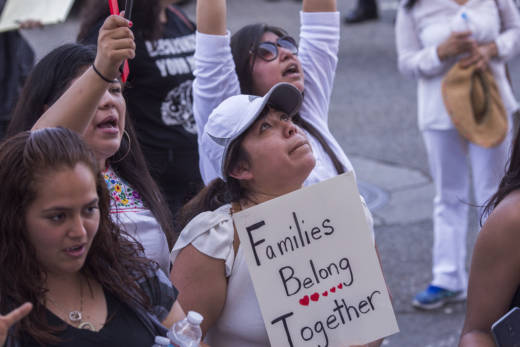Attorneys for the mother, referred to as Ms. Q in court papers, argued that the warrant for her arrest was based on mere allegations that she was involved in a gang, and that she had no criminal convictions in El Salvador or the U.S. and should not be denied reunification with her son based on the warrant.
Judge Friedman agreed.
"It is arbitrary, capricious, and punitive for the government to refuse to reunite Ms. Q and her young son J. on the basis of the warrant,” Friedman said, according to a report by Law360.
Ms. Q was separated from her son J. in March, a few days after being arrested by U.S. Customs and Border Protection officers, according to court filings by attorneys with the National Immigrant Justice Center.
U.S. Immigration and Customs Enforcement (ICE) officials detained the mother in Laredo, Texas, while her son was sent to an Office of Refugee Resettlement shelter for unaccompanied minors in Chicago, Illinois.
On June 26, in a class-action lawsuit in San Diego, U.S. District Judge Dana Sabraw ordered the government to reunite parents and children separated at the border within 30 days.
But ICE found Ms. Q unfit to regain custody of her son based on an arrest warrant from El Salvador, citing her possible affiliation with a gang.
Ms. Q. has denied the allegation, insisting that she fled her home country seeking protection from gang members who had beaten her severely.
In September, attorneys for the American Civil Liberties Union asked Judge Sabraw to overturn the government's decision not to reunite Ms. Q. with her son. They also challenged the ongoing separation of a father from his son, based on a charge of domestic violence for which the man was never convicted.
But Sabraw deferred to the government's judgment.
"The record indicates Defendants have vetted these parents in good faith and made principled decisions in light of their criminal history and overarching concerns regarding safety of their children and the public," Sabraw wrote in a Sept. 19 order.
The Washington, D.C., court ruling could affect 28 additional parents whom the government deemed ineligible to be reunited with their children.
The ACLU, which represents families in the San Diego suit, is in the process of deciding which of the remaining cases to ask the government to reconsider.
J. was 3 years old when he was taken from his mother. The development of the boy, now 4, has been delayed as a result of the trauma of separation, and a psychiatrist has diagnosed him with a language disorder, according to a Sept. 13 declaration filed by his attorney.
